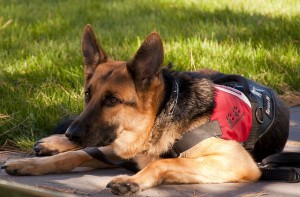Service Dogs
Therapy dogs, service dogs, psychiatric service dogs, assistance dogs, seeing eye dogs, emotional assistance dogs, emotional assistance animals, comfort animals, facility dogs – all those titles – ever wonder what they mean? We’re going to explain the differences. The other day we talked about therapy dogs. Today we’re going to talk about service dogs.
Definition
The U.S. Department of Justice, Civil Rights Division, Disability Rights Section defines service dogs or service animals “as animals that are individually trained to do work or perform tasks for people with disabilities.”
Note that ANY breed of dog can become a service dog. Though many are, not all service dogs are German Shepherds, Labrador Retrievers or Golden Retrievers.
As mentioned in a previous post, it is illegal and unethical for a person to pass their dog off as a service dog just so they can take their dog into a restaurant, store or in the cabin of a plane. Unfortunately there have been a lot of people who have been doing this to the detriment of those who really need a service dog.
Official Service Title and Tasks Performed
Some tasks service dogs perform, along with their official service title are:
• Seeing Eye Dogs aid people who are blind. Often all service dogs are called seeing eye dogs and often people think of service dogs only as seeing eye dogs.
• Hearing or Signal Dogs aid people who are deaf, for example, by alerting them that there is a knock at the door.
• Seizure Response Dogs assist people who have seizures. These dogs alert the person prior to a seizure and protect the person during the seizure.
• SSigDOG (Sensory Signal Dogs or Social Signal Dogs) aid people with autism. They may be trained to keep a person from making repetitive motions, for example.
• Psychiatric Service Dogs help people with mental illnesses, such as reminding the person to take medication or warning a person of the onset of a psychiatric episode.
• Psychiatric Service Dogs also help people with Post Traumatic Stress Disorder (PTSD). For example, the dog may help calm the person during an anxiety attack. Note that PTSD does not just apply to veterans. Anyone that has suffered a major traumatic life event can develop PTSD.
• Medical Alert Dogs are trained to help people with diabetes or other medical conditions. Sometimes seizure response dogs are called medical alert dogs.
• Mobility Assistance Dogs help people in wheelchairs or who have other mobility issues, for example they can help a person get up.
Service animals are not considered pets, they are considered working animals and the work the dog is doing must be directly related to a person’s disability. If the dog is providing comfort or emotional support, they are not considered a service animal. We’ll talk more about that later. Also, if the service animal is being handled by anyone other than the person with the disability, the public rights described here no longer apply. The person with the disability is the only one who has the right to bring their service dog into establishments.
Service Animals and Law
Generally and under most circumstances, a service animal must be allowed to accompany the person with a disability anywhere where the public is allowed to go.
Service animals must be controlled, usually by harness or leash, but if that’s not possible, by voice or signal.
An establishment may only ask “if the dog is a service animal required because of a disability” and “what work or task has the dog been trained to perform.” It is ILLEGAL to ask the following:
• What the person’s disability is.
• Medical documentation.
• ID cards.
• Training documentation.
• A demonstration of the dog’s ability to perform the work or task they’ve been trained to do.
A person cannot be denied access to an establishment because someone is allergic or afraid of dogs. Both parties must be accommodated in this case.
The ONLY legitimate reason to ask a person to remove their dog is if the dog is out of control and/or if the dog is not housebroken. Of course this should not occur if the service animal has been well-trained.
It is ILLEGAL to discriminate against a person with a service dog in any way – for example isolating them, treating them with less respect, and/or charging additional fees. Because a service dog is a working dog, deposits charged to other patrons with pets must be waived. However, if an establishment would charge guests for damage caused by their pets, they may also charge the service dog’s owner if the service dog causes damage to the premises.
FUN FACT: Miniature horses can also be classified as service animals. That’s why at the beginning of this blog we mentioned “service animals” as well as “service dogs.”
Additional information may be found at the ADA website.




I work with dual diagnosed emotionally disturbed intellectually challenged people primarily in their place of residence. I have been taking my bichon to work for a couple of years. She is sensitive and so very good and helpful to these people. I got her a service animal vest. I would prefer to get her some kind of certified training so her work is respected and accepted. I have a Master’s degree in Psychology and have worked with this population since 1997 in NY. Do you provide this or know who does?
Hello,
I am a NYS mental health clinician working with the developmentally disabled here in Ulster County NY and am wondering how the day habilitation center where my office is, might be able to have a therapy dog visit here occasionally-or regularly,